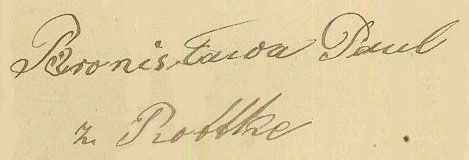Brunis Paul had an unusual name. And unusual names always have trouble sticking.
The first document I ever saw with my great-grandmother’s name on it was a handwritten family tree penciled out by my grandmother Wilma Paul, Brunis’s youngest daughter-in-law. On that piece of paper she wrote out “Berneice”. Perhaps my grandmother can be forgiven for not really knowing her own mother-in-law’s name. If one stresses the second syllable, “Berniece” is somewhat close to “Brunis” and may have been what native English-speakers in Wisconsin called her. In addition, Brunis died five years before Wilma married her youngest son, so it’s unlikely Wilma ever made a careful note of the name as it was spoken by Brunis herself.
Brunis is buried in Elmwood Cemetery, Antigo, Wisconsin, and her tombstone records her name for all posterity as “Brunice”. We don’t know who placed the stone or why s/he chose this spelling, but considering the identical quality of the typeface for Brunis (died 1928) and Julius (died 1942), it seems likely that it was placed long after Brunis’s actual death, thus giving time a chance to wear away old memories.
Other American sources agree on “Brunis”. Her 1928 newspaper obituary spells it that way, as does her daughter Lydia’s 1905 baptismal record. The 1920 United States Census also gives us the nearly identical “Bronis”.
But we don’t really need to guess at all because we have a document signed by Brunis herself with which to settle the matter. When she married in Poland in 1891, Brunis signed her own marriage record: “Bronisława Paul z Rottke” (the ending is a Polish convention where “z” is an abbreviation for “z domu,” literally meaning “from house” but in this context better translated as “née” or “born,” that is, indicating a woman’s maiden name). Moreover Brunis’s 1860 birth registration, her daughter’s 1891 birth registration, and two 1895 ship’s manifests all give the same testimony: her given name is Bronisława.
We don’t really know why she became known in America as “Brunis”. “Bronis” is an uncommon nickname for “Bronisława” in the first place. Moreover “Bronis” is stressed on the first syllable whereas “Brunis” may have been stressed on the second (thus the confusion with “Bernice”). The greatest mystery of all, however, is how a German girl came by the thoroughly Polish name Bronisława in the first place. Sometimes family history research poses questions only our imaginations can answer.
SOURCES
“Bronisława,” Behind the Name.

